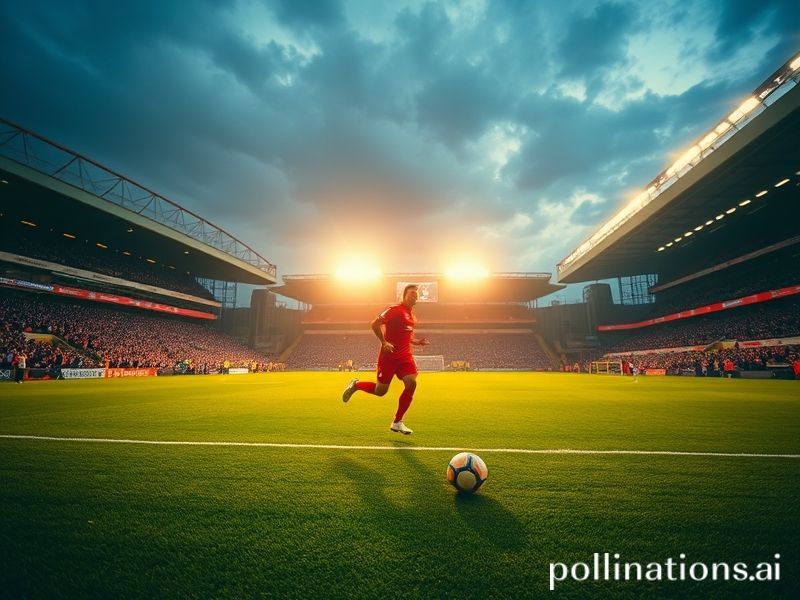Global Red Sea: How Today’s Liverpool Match Quietly Runs the World While We Pretend to Work
Liverpool’s Match Today: A Global Séance in Red and the Quiet Collapse of Time Zones
By Our Man in the Departure Lounge, Thursday
Somewhere between the Indian Ocean and the Irish Sea, a Sri Lankan call-center worker named Ranjith is watching Mohamed Salah ghost past a defender on a cracked Samsung J5. The feed lags, the boss is asleep, and Ranjith’s lunch—rice wrapped in yesterday’s Daily Mirror sports page—goes cold. In Lagos, a generator coughs its last fumes so three friends can keep Jurgen Klopp’s gum-chewing visage alive on a 14-inch screen. In São Paulo, a bar owner flips the channel from riot coverage to the Premier League, because at least the chaos on the pitch has rules and a whistle.
Today’s fixture—Liverpool versus whoever fate and Sky Sports have arranged—is less a football match than a planetary coping mechanism. Kick-off is 20:30 BST, which translates to 02:30 in Bangkok, 09:30 in Bogotá, and “shouldn’t you be in bed?” in every language. Yet the world tunes in, united by the universal desire to watch other people run while we sit very still.
Global supply chains, those delicate spiderwebs we pretend are sturdy, now pivot on whether Virgil van Dijk’s hamstring holds. Vietnamese factories time overtime shifts around the broadcast; container ships outside Rotterdam adjust speed so crews can catch the second half via patchy Starlink. Economists who’ve never seen Anfield call this “soft power.” Everyone else calls it Tuesday.
The geopolitical subplot is, as ever, rich. Fenway Sports Group, the Bostonian custodians of Scouse dreams, recently entertained Qatari investors in town for a yacht expo and a polite look at the balance sheet. Fans fear sportswashing; owners see liquidity. Meanwhile, the U.K. government, fresh from deporting asylum seekers to Rwanda, tweets its support for “our lads” with the solemnity of a royal funeral. Irony files an official complaint but is told to wait outside with the away supporters.
On the pitch, Darwin Núñez will attempt to convert chaos into goals, a task disturbingly similar to U.N. climate negotiators, only with a better haircut. Across the halfway line, the opposition—let’s call them Plucky Underdogs FC for narrative convenience—represent whichever region needs a morale boost this week. Last month it was earthquake relief, next month it might be a currency crisis. The fixture list doubles as a rotating atlas of human misery with added corner kicks.
Bookmakers in Manila price the match in real time; crypto degens in Miami hedge against a Salah hat-trick with NFTs of his left boot. In Beijing, traffic police watch on phones propped against speed guns, silently rooting for anyone but Manchester City. The commentator’s clichés—“this means everything,” “written in the stars”—are translated instantly into 47 languages, diluting meaning like homeopathic medicine.
Yet for all the satellite melodrama, the core transaction remains primitive: 22 humans chase leather while millions project their dwindling hopes onto green rectangles. Psychologists call this parasocial bonding; the rest of us call it cheaper than therapy. When the final whistle blows, Ranjith will restart cold-calling Americans about extended car warranties, the Lagos generator will be kicked awake for the evening news, and that São Paulo bar will switch back to footage of actual riots, a reminder that not all games have referees.
Liverpool might win, lose, or stumble into the sort of draw that feels like kissing your ex: familiar, anticlimactic, faintly embarrassing. The planet will keep turning, its axis slightly greased by collective adrenaline. Somewhere, a hedge-fund algorithm will have made or lost the GDP of Iceland on a stoppage-time corner. And tomorrow, another match, another illusion of consequence, another global congregation chasing a ball and, by extension, some provisional proof that we’re all in the same league after all—even if the table is rigged and promotion is a myth.
Kick-off approaches. Charge your phone, update your VPN, and remember: the only thing more predictable than football is humanity’s need to believe it matters.







